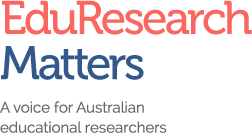Much has been written about the failure of the Aboriginal and Torres Strait Islander Cross Curriculum Priority (CCP) to translate into meaningful inclusion of Aboriginal knowledges in Australian classrooms.
This has come with a fair dose of both criticism and blame of teachers for their perceived inability to integrate the CCPs in their teaching of disciplinary subjects. But what if this wasn’t about the failure of teachers, but instead about a curriculum that is structured in ways that make the inclusion of Aboriginal and Torres Strait Islander knowledges an impossible task from the outset? That’s the question we explore in this new paper just released online with the Australian Educational Researcher.
Aboriginal knowledge in Australia’s national curriculum
Aboriginal and Torres Strait Islander knowledge systems are highly complex, deeply relational and transcend Western, colonial understandings and definitions of knowledge to include relationality via both the human and non human world. Australia’s first national school curriculum was introduced alongside a promise to recognise the richness of these knowledges through the mandated teaching of Aboriginal and Torres Strait Islander histories and cultures. Developed at a time of momentum and hope for the national Reconciliation movement, the Australian Curriculum was designed to be “three-dimensional”, consisting of eight learning areas as well as three cross-curriculum priorities and seven general capabilities.
Aboriginal and Torres Strait Islander content was written into the curriculum as one of the Cross-Curriculum Priorities, alongside Asia and Australia’s engagement with Asia and Sustainability. The Aboriginal and Torres Strait Islander CCP articulates three different aspects: Country/Place, Culture and People. Each of these aspects includes sets of organising ideas embedded within subject areas intended to support teachers’ engagement with the CCP. In practice, this means that Aboriginal and Torres Strait Islander knowledges are to be taught within school subjects like Maths, English, Science and History.
Solutions are more than resources
Critiques of the success of the Aboriginal and Torres Strait Islander CCP have typically taken aim at teachers – painting them as reluctant, unwilling or even unable to engage with Aboriginal knowledges in their classrooms. In the most recent review of the Australian Curriculum, the Aboriginal and Torres Strait Islander CCP was singled out by ACARA as having significant concerns regarding “implementation support and clarity.”
Solutions have focussed on providing teachers with ready-made teaching materials and student resources. These resources are necessary in helping build teachers’ confidence in engaging with Aboriginal knowledges and providing students with opportunities to explore diverse perspectives and ways of knowing. However, as helpful as additional resources are, we are concerned that the continued focus by ACARA on the ‘implementation’ of CCPs neglects the more significant, structural barriers that exist in the very design of the Australian Curriculum. Our analysis revealed that teachers have been set up to fail in their implementation of the CCP by the very structure of the curriculum itself.
Teachers navigating conflicting curriculum
Although the Australian Curriculum claims to be ‘three dimensional’, in reality it is built around a core structure of school subjects which very clearly prioritise Western disciplines, which are described by ACARA as “essential” knowledge for students. The curriculum in relation to subject areas is highly organised and teachers are provided with a high level of precision and clarity in the organising of learning area content into year-level descriptions, achievement standards, content descriptions, and content elaborations.
By contrast, there is not a lot of clarity offered for teachers around the CCPs. Over a period of 10 years they have variously been described as ‘perspectives’; a ‘continuum of ideas’ and more recently as a ‘set of organising ideas’, with ACARA at pains to point out that they cannot exist as distinct learning areas in their own right. Rather than being a clear and necessary component of this ‘three dimensional’ curriculum, they sit as vague ideas beside the very clearly expressed subject areas. As an example, a teacher wanting to explore the Aboriginal and Torres Strait Islander CCP in relation to Country/Place, Culture, and People will need to look for ‘aspects’ for exploration in ‘relevant’ moments in their classroom while they are teaching content in one of the recognised subject areas.
An impossible task
This framing of Aboriginal Knowledges as something only to be encountered through ‘relevant’ content in subject areas is problematic for a few reasons, most notably because Aboriginal and Torres Strait Islander knowledges represent a highly complex way of understanding the world, and one that pre-dates subject disciplines by some 65,000 years (give or take).
Our analysis highlights that ACARA’s efforts to combine a very structured approach to curriculum (in relation to subject areas) with a very vague approach (in relation to the CCPs) creates an impossible task for teachers seeking to meaningfully teach Aboriginal knowledges in their own right. We suggest this is a deliberate, rather than accidental design choice, reinforcing a colonial perspective which diminishes the significance of Aboriginal ways of knowing, and one that ultimately creates barriers to students developing a rich appreciation for the oldest continuing culture in the world.
What should be done differently?
The blame game on teachers as the ‘problem’ in the implementation of the Aboriginal CCP needs to stop. Our research shows that no matter how much teachers want to do this work well (and we know that they do), the curriculum thwarts them at every turn. Instead of quick fix professional learning opportunities and classroom resources, we need to reconsider the very assumptions embedded in the design of the national curriculum – assumptions about whose knowledge is considered ‘foundational’ and thus prioritised.
The overwhelming failure of the 2023 referendum shows we still have a long way to go in fostering a deep and enduring understanding of Aboriginal and Torres Strait Islander knowledge history and culture in Australia. It also says a lot about the failure of the national curriculum to live up to its promises in supporting reconciliation. We think it’s time to reimagine new curriculum structures which place Aboriginal knowledges front and centre, not as ‘other’ or ‘optional’.

Kevin Lowe is a Gubbi Gubbi man from southeast Queensland. He is a Scientia Indigenous Fellow at UNSW, working on a community and school focused research project on developing a model of sustainable improvement in Aboriginal education. Claire Golledge is a lecturer in education and the co-ordinator of HSIE Curriculum (Secondary) in the Sydney School of Education and Social Work. Prior to taking up her position at the University, Claire worked as a secondary teacher of humanities, and in school executive leadership roles, leading teacher professional learning. Phil Poulton is a teacher educator and curriculum researcher in the School of Education, RMIT Melbourne. He completed his PhD at the University of Sydney exploring early career teachers’ curriculum-making experiences in schools. Katherine Thompson has taught in a variety of secondary and tertiary settings in the United States, Australia, and Tanzania. She is currently a PhD candidate in the Centre for Social Research in Health at UNSW Sydney.






